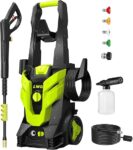
Best Pressure Washers Under $100
Can a $100 machine make the driveway look new again — or is it just soap and optimism?
Short on cash but allergic to grime? The Best Pressure Washers Under $100 can be the quickest way to reclaim a patio, a car, or even a whole weekend back from dirt.
The right model cleans fast, saves water, and keeps chores short. Readers will find practical picks that punch above their price tag without promising miracle power.
Top Picks

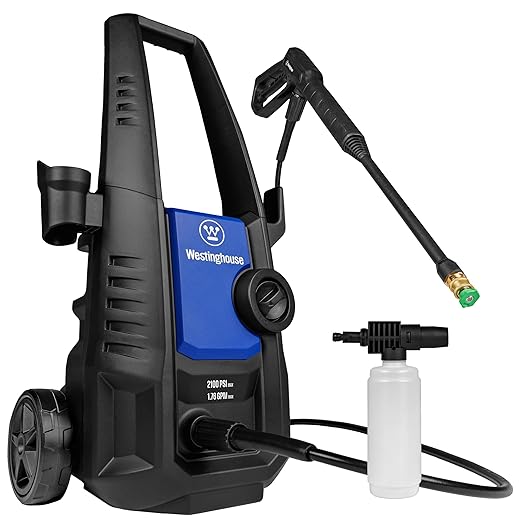



High-Flow 2.5 GPM Electric Pressure Washer
Delivers an unusually high GPM for an electric model, which speeds up rinsing and removes grime efficiently while using less time. It balances portability with performance, though some parts lean plastic and the hose fitting isn’t always universal.
What it is
This model is aimed at users who want faster results from an electric pressure washer. With a claimed 2.5 GPM maximum flow, it emphasizes rinse speed and efficiency—useful when washing large areas like driveways and patios where gallons-per-minute makes a tangible time difference.
Key features
Benefits and limitations
For homeowners who dread long, slow rinses, the higher GPM noticeably cuts job time. It’s effective on cars, patio furniture, sidewalks, and light driveway cleaning. The trade-offs are that it’s still an electric unit—so it won’t replace a gas power washer for heavy-duty paint or grease removal—and a few fittings (in particular, the spray hose connection) can be proprietary, complicating third-party replacement parts.
Practical advice
Buy this if speed and convenience matter: larger surfaces that once required multiple passes will get cleaner faster. Keep a small kit of spare O-rings and check hose connector compatibility if you plan to use aftermarket hoses—some owners prefer to preemptively source adapters to avoid downtime.
Westinghouse 2100 PSI Electric Pressure Washer
Delivers stronger-than-expected cleaning power in a small, lightweight package and is easy to move around and store. Performs well on driveways, decks, cars, and patio furniture but is not a substitute for a gas unit on heavy industrial grime.
What it is
The Westinghouse ePX3050 is a compact electric pressure washer built for homeowners who want more cleaning power than toy-grade machines without the bulk and fumes of a gas unit. It offers a 2100 PSI maximum (1800 PSI rated) and a claimed 1.76 GPM peak flow, which is enough for regular driveway, deck, fence, and vehicle cleaning.
Key features and everyday use
Benefits and limitations
It shines for frequent homeowner tasks: rinsing pollen and mildew off siding, cleaning patio furniture, and routine car washes. The combination of reasonable pressure, a soap nozzle, and a lightweight frame makes it easier to keep surfaces maintained instead of letting grime build until a heavy-duty rent or pro job is necessary. That said, do not expect gas-washer performance for deeply embedded oil stains, large commercial jobs, or heavy paint stripping.
Practical insights
Users praise the low noise, easy assembly, and long cord that reduce the need to reposition the unit. A couple of recurring notes to watch: the hose inlet sits recessed and can be awkward to grip, and the on/off dial’s labeling is nonintuitive for some. For most homeowners who want a reliable, portable, and more powerful-than-cheap-electric option, it offers strong value for the money.
Greenworks 1600 PSI Compact Pressure Washer
A solid, certified option with convenient onboard storage, GFCI protection, and a three-year warranty that eases ownership anxiety. It’s best for recurring homeowner tasks rather than heavy or industrial jobs.
What it is
The Greenworks compact electric pressure washer is a methodical, homeowner-focused machine: CSA-certified, thoughtfully packaged, and targeted at routine cleaning chores—cars, decks, patios, and siding. With 1600 PSI and a 1.2 GPM flow, it prioritizes safe, repeatable cleaning over brute force.
What it includes
Where it fits
This is an appliance for people who prefer maintenance over deferred deep-cleaning projects. It will remove typical outdoor grime, pollen, and light mildew but won’t replace a 2000–3000 PSI gas washer for heavily soiled concrete or paint removal. The three-year warranty helps justify choosing a name-brand appliance over cheaper, no-name alternatives.
Practical tips
Use it as a regular maintenance tool: schedule a quick wash each season instead of waiting for heavy buildup. If someone anticipates large driveways or stubborn, set-in stains, they should compare higher-PSI offerings or consider renting a heavier unit for occasional deep cleans.
Compact Pressure Washer with Foam Cannon
A small, user-friendly electric cleaner that makes car washing and light outdoor tasks simple and fast. It’s economical and portable but can feel tippy and never replaces a higher-pressure machine for deep cleaning.
What it is
This compact electric pressure washer is a space-saving, budget-friendly option aimed at basic homeowner cleaning chores—washing cars, rinsing fences, and spot-cleaning patios. It ships with a foam cannon and four spray tips (0°, 15°, 25°, 40°), which cover most gentle-to-medium cleaning angles.
How it performs
Strengths and trade-offs
Its strengths are convenience and ease of use: quick assembly, a manageable weight for those who struggle with larger machines, and good accessory coverage for common tasks. However, it’s not intended for heavy demolition-style cleaning—expect to spend extra time on set-in stains or to use a scrub brush.
Practical takeaways
If someone needs an inexpensive, lightweight unit for regular maintenance and car care, this fits well. People who want a more stable base or the raw power for brick, heavy moss, or oil-stained driveways should consider a higher-PSI or heavier-duty model.
VEVOR 2000 PSI Portable Pressure Washer
Offers a strong set of accessories—long hose, hose reel, five nozzles, and a foam cannon—at a bargain price, making it appealing for wide applications. Build quality and long-term reliability are mixed across users, so expect to inspect fittings and keep spare parts on hand.
What it is
VEVOR’s electric pressure washer aims to deliver a fully loaded package for budget-conscious buyers: 2000 PSI peak, multiple nozzles including a turbo tip, a 30-foot hose with a built-in reel, and a 500 ml foam cannon. ETL listing and safety features like a trigger lock and TSS (Total Stop System) are included to address basic safety expectations.
Standout features
Trade-offs and durability
While the spec sheet is impressive for the price, user reports are mixed on long-term durability. Several owners praised customer service and rapid cleaning performance, but others encountered broken handles, hose reel fragility, or fitting leaks. This model is a solid value if one accepts the need to check fittings, keep basic spares (O-rings, clamps), or be ready to use warranty support.
Practical recommendations
If someone wants many accessories and a generous hose length without spending much, this unit is worth considering—but buy with the expectation of doing a quick inspection on arrival and possibly reinforcing fragile parts. For those needing rock-solid long-term reliability under heavy use, stepping up to a higher-end brand or model may be a better investment.
Final Thoughts
For readers who want the fastest, most efficient rinsing on a budget, the High-Flow 2.5 GPM Electric is the top pick. Its unusually high GPM for an electric model speeds rinsing and removes surface grime quickly. It’s ideal for homeowners who rinse large areas — decks, siding, and frequent car washes — and value time and water savings. Caveat: some external parts lean plastic and hose fittings may need an adapter.
For someone who wants compact power and easy storage, the Westinghouse 2100 PSI Electric is the best alternative. It delivers strong cleaning in a lightweight package and suits driveways, patios, and routine outdoor furniture and vehicle cleaning. It’s the better choice when slightly higher PSI matters but portability is still a priority.
Guide: How to pick, use, and keep a sub-$100 pressure washer working
What matters most: PSI vs GPM
They should evaluate both numbers. PSI knocks off stuck grime; GPM rinses it away. For small stubborn spots, higher PSI helps. For cleaning decks, siding, or cars quickly, higher GPM is often the better performance multiplier. The High-Flow 2.5 GPM unit is a reminder that flow can matter more than headline pressure for everyday homeowner tasks.
Key buying tips (short list)
Practical use and technique
They should keep the wand moving to avoid etching surfaces. Start 3–4 feet away and move closer when needed. Use a wider nozzle for general rinsing; switch to a narrower tip only for spot cleaning. For cars, use the foam cannon first, let detergent dwell per instructions, and rinse with a wide-angle nozzle to avoid paint damage.
Maintenance and small repairs
Simple upkeep extends life: flush detergent lines after each use, dry and store indoors when possible, and keep spare O-rings and hose adapters on hand. Budget models often show wear at fittings first; a replaced brass connector can turn a flaky hose joint into years of trouble-free use.
Common mistakes to avoid
When to step up from a budget unit
If a homeowner faces oil stains, heavy masonry cleaning, or commercial use, a gas or a higher-end electric with a metal pump and higher PSI/GPM is the next step. For routine home tasks, car care, and seasonal rinses, the selections under $100—especially the High-Flow 2.5 GPM and the Westinghouse 2100 PSI—deliver strong value without needless expense.
FAQ
No. PSI measures pressure and helps remove stubborn grime; GPM (gallons per minute) measures water flow and affects rinse speed. For large surfaces, higher GPM often makes the job faster. The High-Flow 2.5 GPM model shows how flow can beat pure pressure for many homeowner tasks.
They can be. Many budget electrics use more plastic parts and simpler fittings. That trades some longevity for low cost and light weight. Models like Greenworks include safety features and warranties that reduce ownership risk, while VEVOR’s bundle gives accessories but may require more hands-on care.
Yes for car enthusiasts and gentle cleaning. A foam cannon helps loosen road film and reduces scratching during washing. Compact washers with foam cannons make car-care quick. For heavy degreasing, foam helps but won’t replace higher pressure and a proper detergent.
Start with a 25–40° nozzle for general surfaces and rinsing. Use a narrower angle (0–15°) only for very stubborn stains and keep more distance to avoid surface damage. Many budget units include a selection; avoid guesswork and test on an inconspicuous area first.
Often yes, but fittings vary. Some budget washers have nonstandard hose fittings or lower-quality connectors. Buyers should check for included adapters and be ready to swap in a brass adapter if leaks or thread mismatch appear.
After each use: flush the system with clean water, disconnect and drain the hose, wipe down seals and nozzles, and store indoors or under cover. Inspect fittings and replace worn O-rings early to avoid leaks and pump damage.



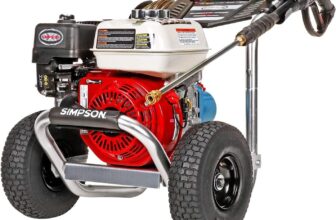
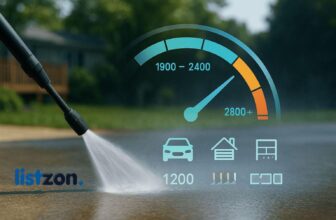
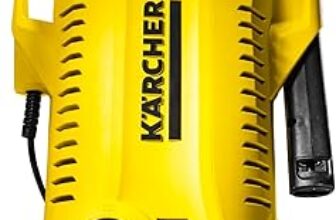
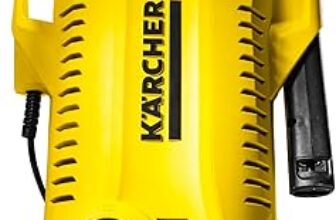

Wanted something to clean fences and paint prep — ended up renting a gas unit. These electrics are great for maintenance but not for stripping paint. Just my experience in case anyone’s thinking pro-level jobs.
Thanks for the reminder. I was hoping to avoid renting but sounds like the right call for big projects.
That’s consistent with our verdicts — electrics under $100 are excellent for maintenance and lighter prep but not heavy-duty industrial work.
Someone please tell me which of these is easiest to store in a small apartment balcony closet. I live in the city and space is a premium.
Greenworks for sure. Lightweight and hooks on a little shelf. The Westinghouse is bulkier but still manageable.
Greenworks and the small ‘500ML’ model are the most compact. Greenworks has onboard storage and a 35 ft cord which helps with flexible storage.
Greenworks fit in my laundry closet behind the mop — it’s pretty compact.
Anyone tried the foam cannon on the Westinghouse vs the cheap ‘500ML’ unit? Is the foam density noticeably different? I want thick suds for my SUV.
In general the Westinghouse paired with a good cannon produces denser foam because of steadier pressure and better nozzle design. The 500ML unit will foam but thinner — still useful for light wash.
Can confirm. Westinghouse makes the foam cannon sing. The cheap ones are more mist than foam.
Westinghouse + decent soap = hotel-level foam. The little one is fine for quick rinses, but don’t expect thick foam.
Quick FYI: check warranty and return window. Greenworks has a 3-year warranty — that made me pick it over the others even if specs were similar.
Good point, Zoe. Warranty can be the deciding factor for long-term peace of mind, especially at this price point.
I almost returned a unit because of a faulty switch — warranty saved me. Always keep receipts/packaging photos.
I appreciate the breakdown of GPM vs PSI in the article. A lot of people focus only on PSI — thanks for stressing water flow. Small real-world note: higher GPM will save time on rinsing big surfaces.
Exactly — PSI gets headlines but GPM determines how quickly grime is removed. Glad the article clarified that.
100% — my 1.76 GPM Westinghouse cuts washing time in half compared to my older 1.0 GPM model.
I’ve used the Power Washer with 4 quick connect nozzles (the first one listed) and it’s a beast for an electric model. High GPM really shows on rinsing off soap and loose mud. Downsides: some plastic bits and the hose adapter wasn’t a universal fit for my old garden hose.
Yes, it includes 4 quick connect nozzles. Super handy switching between spray patterns.
I had to buy a threaded adapter too. No big deal, but worth noting before purchase.
Thanks for the hands-on report, Daniel. The non-universal fitting is a good callout — users may need an adapter.
Does it come with Quick Connects for multiple nozzles? Seems handy.
Low-key tempted by the cheapest ‘Pressure Washer with 500ML Foam Canno’ just to wash my bike and balcony. Anyone who uses it on bikes or patio furniture? Will it be too powerful?
The small model is great for bikes and patio furniture — just use a low-pressure nozzle and keep distance. It’s user-friendly and portable.
I use it on my mountain bike. Keep distance and don’t point it at bearings or delicate plastics directly.
I laughed at ‘tippy’ in the small washer review — that’s accurate. I almost fell over mine when I bumped the hose. If you’re tall and clumsy like me, get one with a wider base or a cart.
Same experience. I put a bench next to it to stop tipping when I swap nozzles 😂
Ha! Noted — stability is an underrated factor. Thanks for the heads-up, David.
Pro tip: wedge a rubber mat underneath to improve grip on smooth surfaces.
Honest question: is 2000 PSI from the VEVOR or 2100 PSI from the Westinghouse really noticeable on dirty driveways compared to the cheaper compact models? I don’t want to buy something that won’t handle oil stains.
For oil, PSI alone won’t magically remove it. Pre-treat with degreaser, agitate, then use the higher PSI/ higher GPM machine. Westinghouse would be my pick among these.
You can also rent a gas unit for heavy jobs if it’s occasional. Saves $ and the small electrics are nicer for routine cleaning.
Higher PSI helps on stubborn stains, but GPM matters too. Westinghouse (2100 PSI, 1.76 GPM) will rinse faster and do a better job on oil than the tiny 1.2 GPM unit. For oil stains you may still need degreaser and a scrub.
I’m torn between the Westinghouse and the VEVOR — both seem feature-packed but the VEVOR’s mixed durability scares me. If you want accessories vs reliability, which would you pick?
I got the VEVOR for garden use and it’s been okay — had to swap a fitting once but the hose reel is super convenient.
If reliability matters more than accessories, go Westinghouse. If you want more range and accessories at the price, VEVOR is tempting but plan for possible small fixes.
VEVOR is tempting for long hoses and reels. If you’re handy, it’s a great bargain.
Same takeaway here. Westinghouse wins for build quality; VEVOR for value and extras.
I bought the VEVOR for my patio because of the long hose and reel. For the price it’s impressive, but after a month one of the fittings started leaking. Not terrible — I just replaced the o-ring — but be prepared to tinker a bit.
Thanks for sharing your experience, Michael. Good tip about checking fittings early — tightening and inspecting o-rings can save headaches.
Same happened to me. Super handy unit but keep spare washers and clamps. YouTube has quick fixes for the common leaks.
Minor nitpick: the article mentions plastic parts but doesn’t say which parts are most likely to fail. From experience, it’s usually the hose quick-connects and the trigger gun internals. Worth calling out for buyers who like to keep spares.
Yep — trigger guns and small fittings. Also inspect the power cord and GFCI on arrival for any damage.
Great feedback — we’ll add a note about common plastic wear points like quick-connects, hose fittings, and trigger assemblies in the next update.
I ended up reinforcing the hose connection with a metal clamp — beefed it up and no leaks since.
Great roundup — thanks! I’ve been looking for something under $100 for quick car washes. The Greenworks looks like the safest bet with that CSA cert and GFCI. Has anyone used it on a car without scratching paint? Curious about nozzle distance and pressure.
Also consider using the foam cannon with a soft mitt. The foam lifts grime so you’re not scrubbing as hard. 👍
Glad it helped, Emma — Greenworks is generally gentle if you use the wider nozzle and keep some distance. The 1.2 GPM is more about steady rinse than brute force. Test on a small area first.
I used the Greenworks last summer on my sedan — no scratches. Keep the spray at least 12–18 inches away and use the foam cannon for suds first.